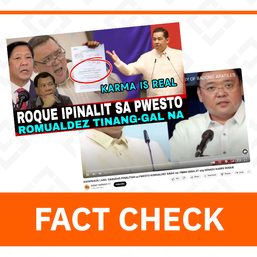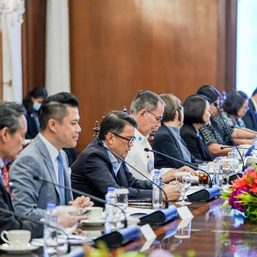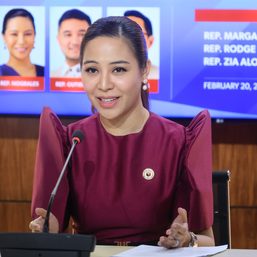SUMMARY
This is AI generated summarization, which may have errors. For context, always refer to the full article.
More senior officials of the embattled Philippine Health Insurance Corporation (PhilHealth), including its president and CEO Ricardo Morales, signed bank secrecy waivers as corruption allegations hound the agency.
As the House continued its investigation into the state health insurer on Monday, August 17, public accounts panel chair Mike Defensor flashed the names of 14 PhilHealth officials who signed waivers allowing the Anti-Money Laundering Council to check their bank transactions. (READ: House panel challenges PhilHealth officials to sign bank secrecy waivers)
The list includes 3 high-ranking PhilHealth officials who cited health reasons for leaving the August 12 virtual hearing before they could commit to signing their bank secrecy waivers: Morales, PhilHealth executive vice president and COO Arnel de Jesus, and PhilHealth legal sector chief Rodolfo del Rosario Jr.
Morales – who earlier admitted before senators that he is battling cancer – would later write to Defensor on August 14. Morales told Defensor he had to excuse himself during last week’s hearing following a nausea attack that left him unable to sit properly and follow the deliberations on that day.
The Philhealth chief also said he was recovering from a chemotherapy session last August 7.
The complete list of 14 PhilHealth officials who signed their bank secrecy waivers are as follows:
- Ricardo Morales, CEO and president
- Arnel de Jesus, executive vice president and COO
- Dennis Mas, senior vice president for Management Services Sector
- Rodolfo del Rosario Jr, legal sector chief
- Jovita Aragona, senior vice president and chief information officer
- Nerissa Santiago, acting senior vice president for actuarial services
- Renato Limsiaco Jr, senior vice president and chief information officer
- Israel Francis Pargas, senior vice president for health finance and policy sector
- Oscar Abadu, vice president for the Member Management Group
- Jonathan Mangaoang, corporate secretary
- Shirley Domingo, vice president for the Corporate Affairs Group
- Walter Bacareza, area vice president for the Visayas
- Francisco Soria Jr, area vice president for the Office of the Area Vice President for Area IV
- Bernadette Lico, acting senior manager for the Corporate Planning Department
Of the 14 officials, 8 have already manifested willingness to sign their bank secrecy waivers last week: Pargas, Santiago, Aragona, Limsiaco, Bacareza, Domingo, Abadu, and Mangaoang.
PhilHealth vice president for the Office of the Actuary Gilda Diaz was among those who agreed to sign a bank secrecy waiver on August 12, but her name was not included in Defensor’s list on Monday.
PhilHealth finds itself embroiled in yet another corruption scandal after whistleblowers told senators that the agency’s executives may have pocketed around P15 billion through fraudulent schemes and bloated its IT sector budget by at least P734 million.
Senators also slammed the “inequitable” Interim Reimbursement Mechanism (IRM) or the reimbursement program for coronavirus patients, which they said have become a tool for politics and corruption within PhilHealth.
The Davao City-based Southern Philippines Medical Center (SPMC) got the lion’s share of the IRM, even if cases there were far fewer than in Metro Manila, the epicenter of the pandemic in the country.
But PhilHealth explained SPMC got the largest allocation because it recorded the highest reimbursement and number of claims in 2019, the basis for the IRM computation.
The state health insurer has since suspended the IRM following the corruption allegations.
House members also want PhilHealth’s case rate system abolished since the agency had already overpaid hospitals a whopping P102 billion between 2013 to 2018, with the system accused of becoming an “unjust enrichment” scheme for hospitals. – Rappler.com
Add a comment
How does this make you feel?



![[OPINION] The First Mode conundrum](https://www.rappler.com/tachyon/2024/03/tl-first-mode-conundrum-03232024.jpg?resize=257%2C257&crop=283px%2C0px%2C720px%2C720px)

There are no comments yet. Add your comment to start the conversation.